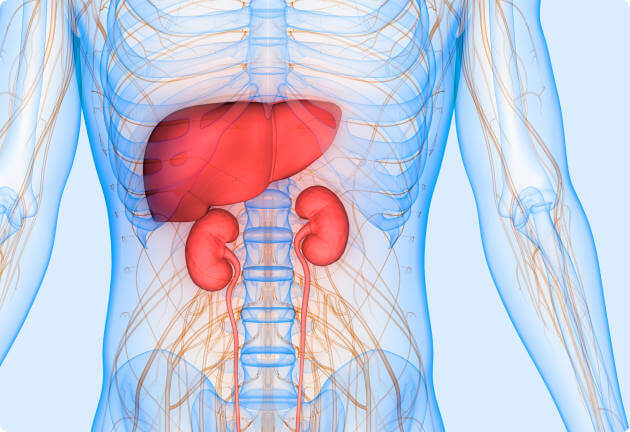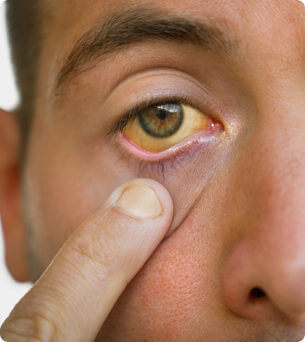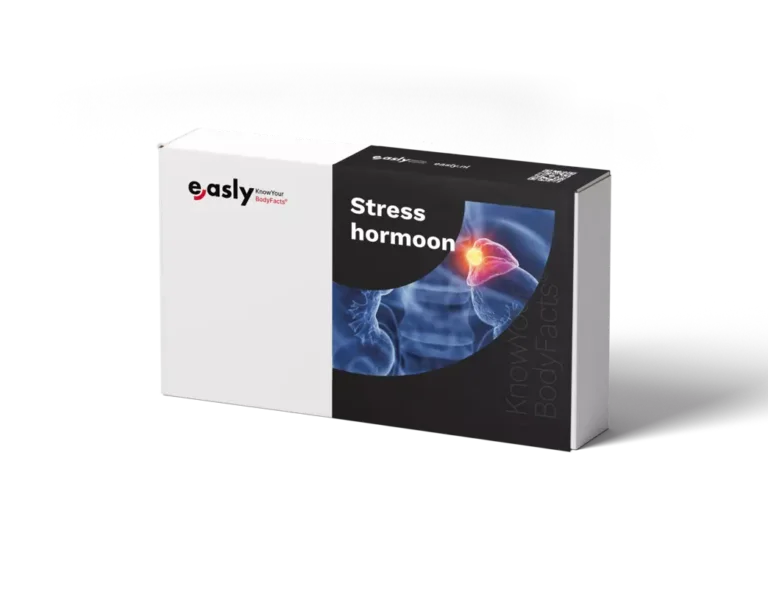In this blog, we’ll tell you all about one of the most crucial organs in our body: the liver. We’ll discuss the anatomy, function, and common issues of this versatile organ. From aiding in food digestion to filtering toxic substances from our blood and storing fuels like glucose, the liver plays a vital role in our well-being. We’ll delve into liver conditions such as fatty liver disease, cirrhosis, and liver cancer, as well as the symptoms you may experience with reduced liver function. Additionally, we’ll share valuable tips to improve your liver health. Curious for more? Keep reading to discover how to care for your liver and what steps you can take to enhance your overall health.
Introduction to the liver: Location, function and common problems
The liver is one of the key organs in the human body responsible for numerous vital processes. Positioned on the right side of your upper abdomen, just below the ribcage, it’s a large organ composed of multiple lobes and weighs approximately 1.5kg. Your liver is engaged in a multitude of processes on a daily basis.
A significant task of the liver is aiding in food digestion; it produces bile for this purpose. Bile is stored in the gallbladder. When you consume food containing fats, bile from the gallbladder travels through bile ducts to the intestines, where it aids in food digestion.

Furthermore, an essential function of the liver is filtering toxic substances from our blood. These can include alcohol, drugs, and breakdown products of medication. They are then converted into less harmful substances that can safely be excreted via urine or stool.
Additionally, the liver serves as a storage site for various substances, such as glucose. Glucose is an indispensable fuel for many bodily processes; it’s notably the primary fuel for the brain. In the liver, glucose is stored in the form of glycogen. When we need extra energy, such as during periods of fasting or during intense physical exertion requiring high energy levels, stored glycogen can be converted back into glucose, which we can then utilize as fuel.
Moreover, the liver produces certain proteins essential for blood clotting. This enables quick healing of wounds and prevents excessive bleeding when we sustain cuts.




When your liver functions less efficiently, for example due to a liver disease, the aforementioned processes may not proceed effectively. This can lead to symptoms ranging from mild to severe. One common liver condition is fatty liver disease, where excessive fat accumulates in liver cells, causing an inflammatory response and subsequent liver damage. Damaged liver cells perform their tasks less effectively than healthy ones, thus affecting the processes mentioned earlier. Additionally, other liver conditions include hepatitis, cirrhosis, and liver cancer. We’ll delve into these later. But what symptoms might you experience when your liver function is compromised?
Symptoms of liver disorders
When liver function declines, you may not immediately experience symptoms or complaints. This is because the liver has a significant reserve capacity. Only when there is considerable damage to the liver cells will noticeable symptoms occur. Possible symptoms you may experience with a liver condition include:
- Fatigue
- Nausea
- Weight loss
- Jaundice: a yellow discoloration of the skin and the white part of the eyes
- Pain in the upper right abdomen
- Swelling of the legs and feet
Additionally, there is often abnormal liver function in the blood. Various types of values can be determined in the blood when assessing liver function.


For example, ALAT and ASAT are determined; these are two types of substances produced by liver cells. In case of liver damage, these substances can “leak” from the liver and enter the bloodstream. In the blood, these values are then elevated.
Furthermore, you can look at alkaline phosphatase (AF), gamma-glutamyl transferase (gamma-GT), clotting times, and albumin. The combination of elevation and/or reduction of the above values can guide the doctor towards a particular diagnosis.
However, abnormal liver function in the blood does not always mean that there is a liver condition. Liver values can also be (temporarily) elevated due to factors such as medication use, recent alcohol consumption, severe obesity, and/or certain foods. In these cases, the liver values will normalize when these external factors change. Are you curious about your liver values? Testing liver values yourself is possible in a very simple way with Easly.
If liver values remain elevated in a repeat blood test or if someone experiences symptoms that could indicate a liver condition, further investigation into a possible cause is necessary. The specialist in liver diseases is the Gastroenterologist/Hepatologist.
Related tests



Causes of liver problems
Causes of liver function decline can be found in both medical conditions and lifestyle factors.
Medical Conditions
There are several types of medical conditions that can cause liver function to decline:
- Fatty liver disease
- Hepatitis
- Cirrhosis
- Liver cancer
- Gallstones

Lifestyle Factors
Various lifestyle factors can also contribute to liver function decline. This is often a reversible process. This means that liver function normalizes when you improve your lifestyle.
Healthy Liver Tips: Preventing Liver Problems
Maintaining a healthy liver is crucial as it serves as a vital organ for safeguarding your body against toxins and waste. By adopting a healthy lifestyle, you can support liver function, enhance liver health, and mitigate the risk of liver problems. But what practices benefit your liver? Below are some tips for preserving a healthy liver
- Limit alcohol intake
Alcohol consumption is a primary lifestyle factor that can impact liver function. Prolonged and excessive alcohol consumption can result in fatty liver, hepatitis, and cirrhosis. It’s advisable to abstain from alcohol entirely. If you choose to drink, limit your intake to no more than one (for women) to two (for men) drinks per day.
- Maintain a balanced, diverse diet
Incorporate plenty of vegetables and fruits into your meals, and ensure adequate daily intake of fiber and protein. This can aid in shielding the liver from detrimental influences. Minimize consumption of processed foods and those high in sugar, saturated fat, or trans fats, as they can adversely affect liver function.
- Manage weight if overweight
Overweight is defined as a BMI > 25, and obesity as a BMI > 30. Being overweight significantly raises the risk of developing fatty liver and cirrhosis. Shedding excess weight can improve liver function and slow the progression of liver conditions.
- Engage in regular exercise
Regular physical activity promotes liver health by reducing the risk of overweight and obesity, and enhancing insulin sensitivity. Reduced insulin sensitivity occurs when the body inadequately responds to glucose in the blood. Insulin resistance is a key risk factor for fatty liver and cirrhosis.
- Avoid smoking
Smoking is a major risk factor for liver cancer. - Be cautious with medications
Always consult a doctor before starting new medications, as some can affect liver function.



In conclusion, a healthy lifestyle strongly influences liver function. Diminished liver function may not manifest immediate symptoms but only becomes noticeable once liver damage has occurred. To optimize liver health, maintaining a healthy lifestyle is paramount. Curious about your liver function? Easly offers liver tests to gauge liver function. It’s important to note that an abnormal result doesn’t necessarily indicate a liver condition. Furthermore, always seek medical advice if experiencing symptoms, as a doctor can recommend appropriate tests.
Sources:
- MDL stichting – https://www.mlds.nl
- NHG Richtlijn – https://richtlijnen.nhg.org







